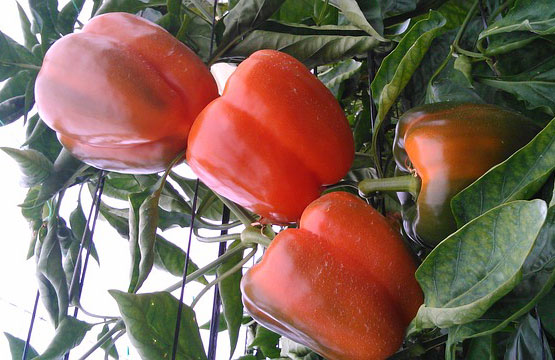Simlaw Seeds, a subsidiary of Kenya Seed Company has launched a new high yielding capsicum variety that matures within 70 to 85 days with long harvesting period of up to four months with potential yields of 250,000 fruits per ha.
The company sells 5g of the seeds at Sh1,470, 10g costs Sh2,390 while 25g costs Sh7,280 while 50g retails at Sh14,560. One acre of land requires 100g of the seeds according to data released by the company about the variety.
With the new variety victory F1, farmers can earn Sh1m per ha for planting 10,000 plants that can yield 15 to 25 fruits with each fruit retailing at five to 10 shillings depending on the size with an initial capital investment of Sh150,000. Victory F1 grows well in both outdoor and greenhouse and can be harvested either while still green or when it turns red.
Related
Yellow capsicum earns twice, has wider market than red type
Tomatoes and capsicum lift youths’ fortunes
Pruning cuts pests, increases capsicum yields
In Kenya, capsicums grow well in altitudes of up to 2,000 meters above sea level. It does well in well drained loamy soils with optimum Ph levels of 6.0 to 6.5 and is recommended to be planted in the months of July/August due to the cool night temperatures available during the period.

The seeds are first planted on a raised nursery bed measuring one meter in width by any convenient length where manure is applied at 20 kilos per meter square.
To plant the seeds, drill rows 15cm apart and cover thinly with soil. To allow for growth of healthy seedlings, thin to five centimeters after germination.
In the nursery, the seeds will take a maximum of 21 days to germinate and are ready for transplanting after 45 days.
In the main bed the seedlings are spaced at 75cm by 45cm and one acre of land can put up 10,000 plants.
Organic manure is recommended at 10 tons per ha or alternatively apply 250kg of double super phosphate per acre.
Top dressing of the crop should be done when the plants attain a height of 15cm with 100kg of nitrogen per hectare. This should be repeated after one month where 200kg of CAN is applied.
Capsicums are affected by various pests and diseases which include blossom end rot, cut-worms, root nematodes damping off.
Blossom end rot is usually caused by lack of calcium and is characterized by black or dark brown spots on immature fruits. To control it, plants should be watered evenly probably by drip irrigation to ensure the calcium is absorbed by the fruits particularly at the formation stage.
Sometimes the seedlings may fall off and rot and this is referred to as damping off. To avoid damping off, the soil has to be kept firm at the base of the seedling to ensure there is no excess water around the plant.
Nematodes and cut-worms are controlled by crop rotation.
Kenya’s flower, vegetables and fruits earnings increased by 11 per cent to Sh115.25bn in 2017 despite the political and economic challenges experienced in the country during the period.
The Kenya National Bureau of Statistics reports that the horticulture sector is the fastest growing sub-sector in the agriculture industry and comes at a time when the country is set to launch direct flights to the United States of America following the upgrading of the Jomo Kenyatta International Airport to a category one status.
According to data released by the Fresh Produce Consortium of Kenya on 19th April 2018, flowers were the highest earner fetching Sh80.24bn up from Sh70.83bn recorded in 2016. In this, 159,961 tonnes of flowers were exported representing an 11.6 per cent increase.
56,945 tonnes of fruits were exported last year earning Sh9bn while 87,240 tonnes of vegetables were exported during the period earning the country Sh24bn in foreign exchange.